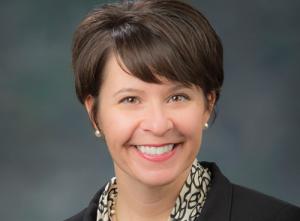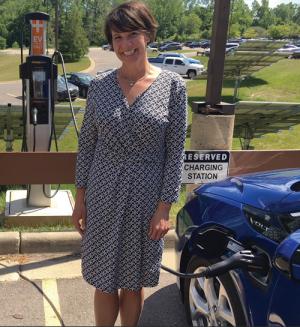Sally Talberg, Chair, Michigan PSC
PUF: What's a typical day like?

Chair Talberg: I don't know if there's necessarily a typical day. It's a mixture of a lot of reading, meetings with stakeholders, and speaking events. We have a tremendous number of significant cases that are before us, which require deep dives into those proceedings.
Also, as chair, I have administrative and organizational responsibilities, as well as coordination with the Governor's office and state policy makers.
PUF: What's your take on the state of the electric power industry?
Chair Talberg: If there's one word that comes to mind, it's dynamic. We see a lot of change, particularly here in Michigan, with our power generation transforming rapidly.

In about a decade's time span, about half of our coal fleet is retiring. Addressing how to meet our energy needs going forward has been front and center, in terms of the issues before the Commission.
We are moving toward a cleaner portfolio of energy options in Michigan, with the retirement of the older coal plants and increased use of natural gas and renewable energy. Energy waste reduction, or energy efficiency, is also an integral part of meeting our energy needs.
With this transition underway, Michigan's energy supplies are expected to remain diverse, with several nuclear plants, pumped storage, coal, natural gas, and renewable energy in the state.
Renewable energy is driven in part by policy changes at the legislature, but also the cost of wind energy coming down significantly.
PUF: Dynamic can be fun or nerve-wracking. Which of those is it?
Chair Talberg: I think it's a little bit of both. I'm optimistic that Michigan will be successful with the landmark state energy laws that were passed in 2016. These comprehensive energy policy reforms provided a great blueprint to help adapt to the changing world around us and make sure we're addressing issues like resource adequacy, given our unique market structure and changing generation supplies.
The technology change with energy storage, solar, electric vehicles, and other advancements and the increased engagement of customers could be profound in terms of the impacts on the overall regulatory and utility business models.
PUF: You're also in the heart of the automobile industry. What do you see about the future of the electric power industry and the electric vehicle?
Chair Talberg: The automobile industry runs in our veins here in Michigan. The Commission has been undertaking stakeholder processes to discuss how to prepare for the electrification of the transportation sector.
Specifically, we have been examining utility rates and the need to send the right price signals, and infrastructure planning for electric vehicles on the distribution system, to make sure we're mitigating any impacts. If implemented properly, we can benefit overall from increased use of electric vehicles in the state.
There are a lot of different forecasts out there. Given the announcements from the automotive companies, both domestic and international, it seems like the growth in electric vehicles could be significant, especially given the move toward autonomous vehicles. This is an area Michigan has been prioritizing on the research side.
PUF: It seems like you're at the epicenter for a few of these things, like the renewables. You also talked about coal, and transportation electrification. All this change might be pretty good for Michigan?
Chair Talberg: Definitely. The other key factor that comes into play in Michigan is the intersection between natural gas and the electric industry.
We have the most natural gas storage in the country due to our geology, additional natural gas pipelines being built in the state, and access to different gas producing markets.
We also have a pumped hydroelectric facility that was built in the '70s and is undergoing major upgrades to increase capacity. These resources can quickly respond to changes in customer demand and complement renewable energy, such as wind, in the state.
Again, I'm optimistic that we're going to continue to advance cleaner energy supplies, and we can do that in a reliable manner. There's also the integration of new technologies, whether it's electric vehicles, or storage, or other opportunities that can benefit customers.
PUF: How do you see your own role?
Chair Talberg: I have two overarching priorities at the Commission. One priority deals broadly with infrastructure modernization, whether that's gas, electric, or telecommunications.
The need to address aging infrastructure and integrate new technologies has been an emerging theme. Infrastructure investments are a major driver of rate cases and other proceedings before the Commission.
The second priority that's near and dear to my heart, because I was on staff here at the Michigan Commission, and also in Texas, previously, is the focus on staff attraction and development.
The Michigan Commission hired a lot of people in the seventies, and they're coming up on retirement. Being able to retain and transfer that knowledge base is crucial. It's also important to bring on new people to fill critical roles at the Commission.
The staff makes a tremendous difference, in terms of the decisions the Commission makes, and overall, for the residents of Michigan.
PUF: How do you attract the young people and make them realize there is a great future in the energy industry?
Chair Talberg: One of the areas we focus on is being able to retain our existing talent. For example, in the past, we have hired economists or engineers, but they may pursue other opportunities after a few years when they become very skilled and knowledgeable.
We try to create additional specialist positions with higher pay given the complexity of the work at the Commission, and open opportunities where individuals can move up in the organization, both on the management track, as well as in non-managerial roles.
Retaining our talent is going to be critical to help fill in for individuals who are retiring after, oftentimes, over forty years.
PUF: I guess you feel that dynamic is a pretty good thing for going forward?
Chair Talberg: I think so. We had broad, bipartisan legislation that was passed at the end of 2016, that provided a blueprint for more affordable, reliable energy for Michigan residents.
We are focused in Michigan on being able to adapt to a lot of the changes we see coming, whether that's the regulatory model itself, examining options like performance-based rate making, to planning long-term to modernize our electric grid and resource supplies.
I think we have an excellent foundation, with this legislation, to navigate the changes going forward, so I'm optimistic about Michigan's energy future and the Commission's role in helping to shape it.
State and Future of Power articles:


